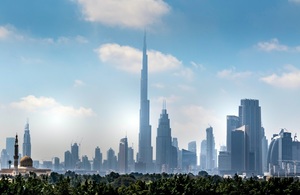Hundreds of Scottish businesses set to benefit as UK launches trade deal with Gulf nations
The landmark deal is expected to add at least £270 million a year to the Scottish economy, with food and drink and renewable energy businesses set to benefit.

Dubai skyline
Trade Secretary Anne-Marie Trevelyan is launching free trade negotiations today (Wednesday 22 June) between the UK and the Gulf Cooperation Council (GCC) that could provide a huge boost to hundreds of Scottish businesses.
A free trade agreement with the GCC, made up of Bahrain, Kuwait, Oman, Qatar, Saudi Arabia, and the UAE is estimated to bring a boost of over £270 million to the Scottish economy.
In a visit to Riyadh, Saudi Arabia, the Secretary of State will meet GCC Secretary General, Dr Nayef Falah M. Al-Hajraf, and Saudi Arabian trade minister, Dr Majid Bin Abdullah Al Qasabi to kick off talks which are expected to culminate in a trade deal worth £1.6 billion more a year to the UK economy as a whole.
It is the fourth major Free Trade Agreement (FTA) launched by the Trade Secretary this year, following visits to kick off talks in India in January, Canada in March, and the launch of negotiations with Mexico last month.
Trade Secretary Anne-Marie Trevelyan said:
Today marks the next significant milestone in our 5-star year of trade as we step up the UK’s close relationship with the Gulf.
Our current trading relationship was worth £33.1 billion in the last year alone. From our fantastic British food and drink to our outstanding financial services, I’m excited to open up new markets for UK businesses large and small, and supporting the more than ten thousand SMEs already exporting to the region.
This trade deal has the potential to support jobs from Dumfries to Doha, growing our economy at home, building vital green industries and supplying innovative services to the Gulf.
Just under £800 million worth of Scottish goods were sold to the GCC in 2021, with the main exports including beverages and industrial machinery.
A UK-GCC deal will also mean significant benefits for farmers and producers, as the Gulf is highly dependent on imported food. British food and drink exports to GCC countries were worth £625 million last year, and a deal could significantly reduce or remove tariffs on UK food and drink exports.
UK Government Minister for Scotland Malcolm Offord said:
A free trade deal with the Gulf nations offers massive potential for Scotland’s farmers, as the region imports 90% of the beef and lamb it consumes. Reduced tariffs could help us export more great Scottish produce, getting beef reared in Aberdeenshire onto supermarket shelves in Abu Dhabi.
Our world-class services sector and thriving digital businesses would also stand to benefit, helping grow our economy and supporting Scottish jobs.
Tariffs that could be slashed include cereals, which currently face a tariff of up to 25%; chocolate, up to 15%; baking products, up to 12%; sweet biscuits, up to 10%; and smoked salmon, which has a 5% tariff at present.
One company that is set to benefit is Aberlour headquartered Walker’s Shortbread, which already exports to all six member states.
Alastair Walker, Head of International Sales at Walker’s Shortbread said:
Walker’s Shortbread has been exporting to GCC countries since the 1970’s. Our business has steadily grown, particularly in the UAE, Qatar and Kuwait.
We have a diverse product range across Grocery, Retail, GTR and Food Service. This region is integral to Walker’s plans for future growth.
300 Scottish businesses having already exported goods to Qatar alone in 2021, it is also hoped that a deal could allow more companies to start trading in the region.
And with financial and insurance activities accounting for 35% of Scotland’s services exports, a deal with the GCC could open doors for Edinburgh and Glasgow’s thriving tech and digital hubs.
UK businesses in the renewable energy industries will also play a role in supporting GCC countries as they diversify their economies to move away from a reliance on oil and towards other sectors.
The UAE, for example, has set a target of generating 50% of its electricity from renewable sources by 2050. Exports of UK wind turbine parts currently face tariffs of up to 15%.
RenewableUK’s CEO Dan McGrail said:
The global transition to clean energy includes countries throughout the Middle East which are seeking to make the most of their excellent renewable resources such as solar and wind. The UK is already exporting goods and services to the region - providing, for example, expertise in onshore wind.
As a global leader in wind, marine energy and green hydrogen, we’re perfectly placed to help other countries to accelerate their efforts to decarbonise their energy systems - and to boost our own economy by exporting around the world.